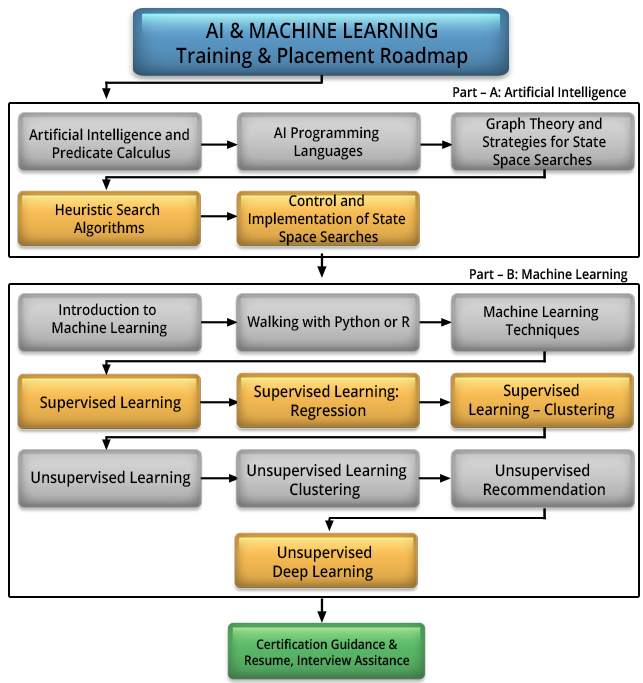
Description
Artificial Intelligence (AI) being a part of computer science, it’s a broader concept of machines being able to work in a smarter way. Machine Learning (ML) involves concepts of mathematics or an applied statistics. Artificial intelligence incorporates Machine Learning with an idea of allowing machine to access data and learn by themselves. Artificial Intelligence or Machine Language has altered the process of data-driven business leaders in making decisions, gaging their businesses, studying human behavior, and viewing predictive analytics. To release the benefits of this extraordinary field, an organisation needs the right minds quants and translators. There is a huge demand for both Artificial Intelligence and Machine Learning experts to build smart machines that are truly intelligent. Enroll Machine Learning and Artificial Intelligence training to gain complete knowledge on core concepts of Artificial Intelligence and Machine Learning.
Did you know?
1. According to Forbes predictions the theoretical research in Machine Learning will gradually lay the path for business solutions. Smart Machine Learning algorithms can implement massive loads of both dynamic and static data to continuously learn and improve for improved performance.
2. Gartner predicts that the combination of Artificial Intelligence and Machine Learning will deliver more systems that can efficiently learn, understand, adapt predict, and work.
3. In 2017, Forrester proposed that the Artificial Intelligence and Machine Learning Cloud will increasingly depend on IoT data as sensors and smart applications to take over each aspect of our day to day activities.
Why learn and get certified in Machine Learning and Artificial Intelligence?
1. World wide success of Artificial Intelligence and Machine Learning is noticeable from each stream. Like Amazon recommends the type of movies which you might like to see self-driving Google cars that can inform a tree from a pedestrian.
2. Real-time applications of Machine Learning and Artificial Intelligence are deployed for the welfare of companies and clients, in categories like recommender systems, prediction and classification, computer vision, hybrid and many more.
3. Harvard Business Review endorses it as the hottest job for today’s digital world due to its remarkable achievements in the R&D sector.
Course Objective
After the completion of this course, Trainee will:
1. Potential to find applications areas of Artificial Intelligence
2. Basic techniques and ideas to design intelligent computer systems
3. Understand the Statistical and Decision–theoretic Modelling Paradigm
4. Gain ability to develop agents that exhibit learning and reasoning
5. Attain confidence to apply classification, regression, retrieval, clustering, recommender systems.
Pre-requisites
Efficient programming skills with basic knowledge in python or R, mathematics and applied statistics.
Prepare for Certification
Our training and certification program gives you a solid understanding of the key topics covered on the Machine Learning and Artificial Intelligence Certification. In addition to boosting your income potential, getting certified in Machine Learning demonstrates your knowledge of the skills necessary to be an effective Professional. The certification validates your ability to produce reliable, high-quality results with increased efficiency and consistency.
Part – A: Artificial Intelligence
Unit 1: Artificial Intelligence and Predicate Calculus
- Introduction
- AI Roots and Applications
- Propositional Calculus
- Predicate Calculus
Unit 2: AI Programming Languages
- Prolog and Lisp
- Syntax
- Data Types
- Control Mechanisms
Unit 3: Graph Theory and Strategies for State Space Searches
- Graph Theory & Finite State Machine
- State Space Search Algorithms
- Reasoning Strategies
Unit 4: Heuristic Search Algorithms
- Heuristic Search Issues
- Heuristic Search Applications
- Hill Climbing Algorithm
- Dynamic Programming
- Best-first Search
Unit 5: Control and Implementation of State Space Searches
- Related Issues
- Recursion-based Searching
- Production and Blackboard Systems Architecture
Part – B: Artificial Intelligence
Unit 1: Introduction to Machine Learning
- Introduction to Big Data and Machine Learning
Unit 2: Walking with Python or R
- Understanding Python or R
Unit 3: Machine Learning Techniques
- Types of Learning
- Advice for Applying Machine Learning
- Machine Learning System Design
Unit 4: Supervised Learning
- Regression
- Classification
Unit 5: Supervised Learning: Regression
- Predicting House Prices: A Case Study in Regression
Unit 6: Supervised Learning – Clustering
- Analyzing the Sentiment of Reviews: A Case Study in Classification
Unit 7: Unsupervised Learning
- Clustering
- Recommendation
- Deep Learning
Unit 8: Unsupervised Learning Clustering
- Document Retrieval: A Case Study in Clustering and Measuring Similarity
Unit 9: Unsupervised Recommendation
- Recommending Products
Unit 10: Unsupervised Deep Learning
- Deep Learning: Searching for Images
